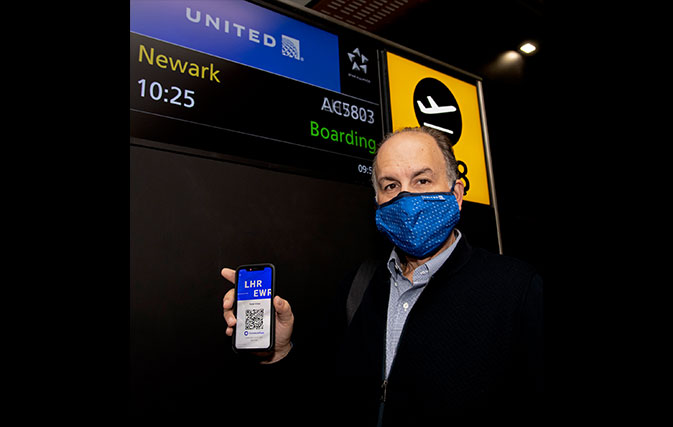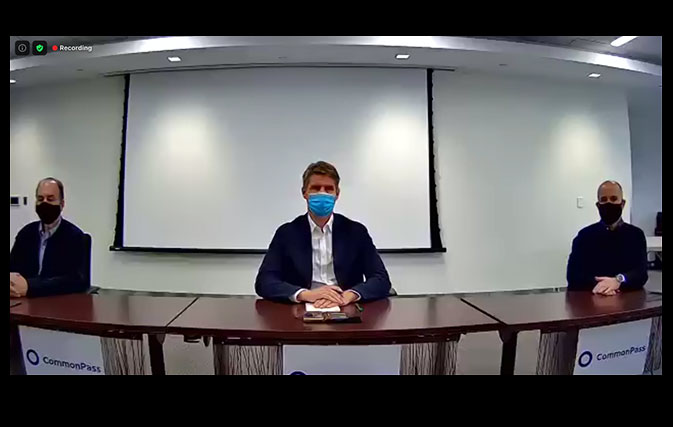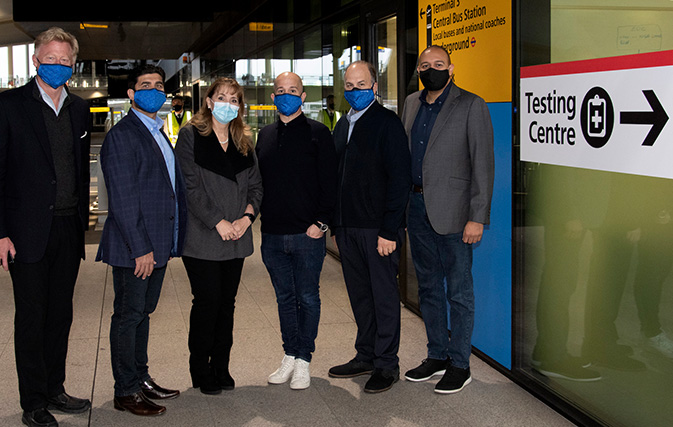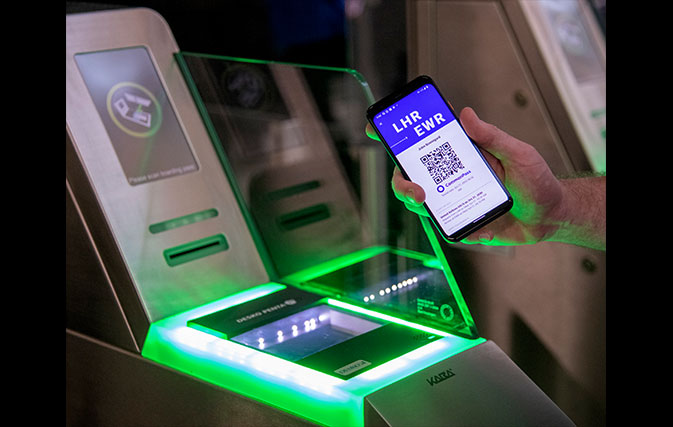NEWARK, NJ — The first transatlantic trial of CommonPass, a digital ‘COVID-passport’ that allows travellers to share their health status across international borders, was successfully completed yesterday, marking a major milestone in the recovery of global travel.
Created by Switzerland-based The Commons Project and the World Economic Forum, CommonPass, which is enabled through a free-to-use smartphone app, was tested by volunteer travellers landing at Newark Liberty International Airport from London Heathrow on Oct. 21. United Airlines Flight 15 marked the second successful trial of the pass; the first trial took place onboard Cathay Pacific on Oct. 6 between Hong Kong and Singapore.

Internova’s Peter Vlitas holds up the QR code on the CommonPass health pass
During a media briefing following Flight 15, Paul Meyer, CEO of The Commons Project, said CommonPass has been a two-year venture, born from the idea that digital services must be built and operated and scaled for the common good.
“We had no idea, of course, at the time that our world would be facing a pandemic and would be shut down,” said Meyer. “So one of the reasons why we’re so excited about CommonPass and our extraordinary collaboration of partners around the world, is that we think it can become a concrete tool that can allow our world to begin to be reconnected and open up again.”
Among the volunteer travellers on yesterday’s flight were J.D. O’Hara, CEO of Internova Travel Group, parent company of Travel Leaders Group, and Peter Vlitas, SVP, Airline Relations at Internova, both of whom also attended the briefing. According to O’Hara, the entire CommonPass experience was easy to use and understand from start to finish. After downloading the app, “as you would any other app,” O’Hara and Vlitas were tested at Heathrow and within 30 minutes, their negative results were uploaded into the CommonPass app. They then flashed the app to Immigration where it was recognized and verified via a QR code before boarding the plane. Upon landing in Newark, they once again flashed the app to Immigration officials, clearing them to immediately enter the country.

From l-r: Peter Vlitas, Paul Meyer and J.D. O’Hara at yesterday’s media briefing
“This is really an historic event in the sense that up until now, there’ve been mandatory quarantines for up to 14 days,” said O’Hara. “I can tell you as a user, as I boarded the airplane, knowing that everyone around me had just tested negative was a much safer feeling than knowing they’re going to quarantine for 14 days upon arrival – by then it’s too late.
“We at Internova are so committed on behalf of our 65,000 travel advisors worldwide to really make this work. We hope that we can see some scale from it and it becomes part of the new normal.”
Officials from both the U.S. Customs Border Protection (CBP) and the Centers for Disease Control and Prevention (CDC) were in Newark to observe the demonstration. Meyer said he was “delighted” to have them on hand.
“The pilot was seen by all as successful, both on the London side as well as here in arrival, and we’re very excited about where we go from here,” he said. “The goal of this pilot is to really demonstrate to governments that this is a framework that they can rely on as they’re starting to think about how to adapt their border policies and begin to open up. As we start to build up confidence with our government partners around the world, this this will hopefully become something that allows travel to start to really resume on a broader scale.”
HOW DOES IT WORK?
At present, COVID-19 test results for travel are frequently shared on pieces of paper – or photos of the paper – from unknown labs, often written in languages foreign to those inspecting them. This, said Meyer, leaves room for confusion and even falsification of results.
Through CommonPass, passengers can use the free app to find participating certified and accredited labs and testing sites, retrieve lab results and complete health attestations. The app and its associated data platform can confirm that a user’s results are in line with the destination’s requirements and generates a QR code that authorities can use to confirm compliance.
According to Meyer, after O’Hara and Vlitas were tested at Heathrow yesterday morning, they were given an account by their participating laboratory. Through the CommonPass app, they were then able to log into the laboratory system, therefore verifying their identity, and pull their results automatically into the app.

Pictured, left to right, at London Heathrow Airport are: Hermann Elger, President, Sharecare; Arif Kamal, Director Revenue Management, Global Travel Collection; Gloria Guevara, World Travel & Tourism Council President & CEO; J.D. O’Hara, CEO, Internova Travel Group; Peter Vlitas, SVP, Airline Relations, Internova Travel Group and Jason Oshiokpekhai, Managing Director, Global Travel Collection.
The system is designed to support different types of lab tests; The CommonPass Foundation is currently building a global network of participating laboratories and other health data sources that are accredited or certified.
“Ultimately, people can get tested at different locations such as the airport or at laboratories in their community,” added Meyer. “They can then bring their results – digitally – with them to document that they’ve satisfied whatever rules are put in place either by the airline or the government of the country they’re seeking travel to.”
THE NEXT STEPS
After the successful trials with Cathay Pacific and United Airlines, Meyer and the Foundation are currently working with many other large airlines to plan routes across Europe, the Americas, Africa, the Middle East and Asia. According to Meyer, CommonPass will be rolling out in November and December before broad-scale deployment starting at the beginning of 2021.
“It’s become crystal clear that this model, ultimately, needs to be globally operable,” said Meyer. “That said, we are beginning with certain corridors, such as Hong Kong-Singapore and London-New York, but will be expanding in the next month to additional corridors and routes because that’s where trust begins.
“This is really about creating a common-trust framework where participating countries can say, ‘Okay, I’m willing to begin to open up because I can trust that someone who got tested before they got on the place actually did get tested, and I can rely on and trust that.’ So I hope more and more countries do engage. That’s why we’re in close dialogue with many organizations to present this to many countries – if not all countries – and explain how they can participate.”
WHAT ABOUT PRIVACY?
According to Meyer, the CommonPass framework protects privacy because users are not required to share their health information – only compliance or non-compliance. Additionally, CommonPass could be deployed by countries without waiting for a broader international agreement.
“We don’t believe that people should have to hand over their personal health information to either an airline or a government just because they want to travel,” said Meyer. “The way we’ve designed CommonPass and the framework is to allow health data to stay within the individual’s control. The platform verifies the traveller has been tested, but that information is not stored nor is it conveyed to either the airline or the government. That is how we’ve able to do this in a way that protect individual’s personal health data and privacy and, of course, complies with many data privacy regimes.”
WHY IT’S IMPORTANT
With mandatory quarantines still in place around the world, a safety measure that many global organizations like IATA and the World Travel & Tourism Council (WTTC) say is devastating the global travel industry, CommonPass’ capability to verify lab results and, later, vaccination records can potentially eliminate the need for travel bans and quarantines.
Dr. Bradley Perkins, Chief Medical Officer of The Commons Project and former Chief Strategy & Innovation Officer at the CDC, also noted that some rapid tests are not 100% reliable, not to mention the fact that infectious people can test negative prior to showing any symptoms.
“Without the ability to trust COVID-19 tests – and eventually vaccine records – across international borders, many countries will feel compelled to retain full travel bans and mandatory quarantines for as long as the pandemic persists,” he said. “With trusted individual health data, countries can implement more nuanced health screening requirements for entry.”
CommonPass’ system is intended to be adaptable whenever destination requirements change. Meyer said that this capability will be important after the arrival of vaccines, which may differ as to number of doses and length of time they’re effective.
“The ability to demonstrate that one has been vaccinated is going to be a part of this process for some time to come,” said Meyer. “It’s still required today to demonstrate in many countries that you’ve had a yellow fever vaccination and bring with you a yellow card tucked into your passport. In some ways, CommonPass is a digital mechanism to do exactly that.”
With file from The Associated Press

